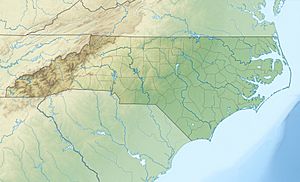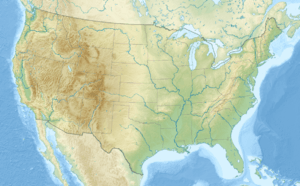Lockwood Folly River facts for kids
Quick facts for kids Lockwood Folly River |
|
|---|---|
|
Location of Lockwood Folly River mouth
|
|
| Other name(s) | Tributary Atlantic Ocean |
| Country | United States |
| State | North Carolina |
| County | Brunswick |
| Physical characteristics | |
| Main source | Confluence of Red Run and Pinch Gut Creek about 0.5 miles southwest of Clements Curve, North Carolina 23 ft (7.0 m) 34°04′03″N 079°11′47″W / 34.06750°N 79.19639°W |
| River mouth | Atlantic Ocean Holden Beach, North Carolina 0 ft (0 m) 33°55′04″N 078°14′10″W / 33.91778°N 78.23611°W |
| Length | 22.36 mi (35.98 km) |
| Basin features | |
| Progression | south and southwest |
| River system | Atlantic Ocean |
| Basin size | 136.22 square miles (352.8 km2) |
| Tributaries |
|
| Bridges | US 17, Old Ocean Highway E, Gilbert Road SE, NC 211 |
The Lockwood Folly River is a short tidal river located in Brunswick County, North Carolina, in the United States. A tidal river means its water levels change with the ocean's tides. Water from the Green Swamp flows into this river near Supply. From there, the river travels south and empties into the Atlantic Intracoastal Waterway near Sunset Harbor. The Lockwood Folly Country Club in Varnamtown gets its name from this river.
The Lockwood Folly Inlet is a nearby opening that connects the Atlantic Ocean to the Intracoastal Waterway. This inlet used to be the natural mouth of the Lockwood Folly River. However, due to the building of the Intracoastal Waterway and natural sand movement, the inlet now separates the barrier islands of Oak Island and Holden Beach Isle.
Contents
How the Lockwood Folly River Got Its Name
There are two old stories that explain how the name "Lockwood Folly" came to be. These stories are like local legends.
The Story of Lockwood's Dream Boat
The first story says that a man named Lockwood started building a very special boat on the riverbanks. He worked hard for many months to finish his dream sailing ship. But when he tried to float the boat, he found a big problem. The boat's bottom, called the draft, was too deep. It couldn't get over the sandbar at the river's mouth.
Because he couldn't sail his ship out to the ocean, Lockwood sadly left it to rot. People in the area started calling the abandoned ship "Lockwood's Folly." Over time, this name was also used for the river and the nearby inlet.
The Story of Lockwood's Colony
The second story tells of a group of settlers led by a man named Lockwood. They decided to start a new community along the river. But Lockwood supposedly didn't bring enough supplies, or maybe they had a disagreement with the local Native American tribe. Because of these problems, the colony had to be given up.
According to this story, the remains of this failed settlement were called "Lockwood's Folly." Later, this name spread to include the river and the inlet close by.
An Old Map's Clue
The name of the river, "Lockwood's Folly River," can be seen on a map made by John Ogilby in 1671. This makes Lockwood's Folly River one of the oldest named rivers in North Carolina.
 | Kyle Baker |
 | Joseph Yoakum |
 | Laura Wheeler Waring |
 | Henry Ossawa Tanner |



